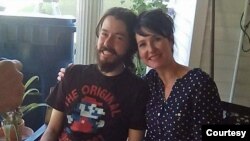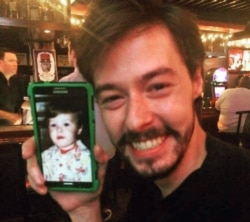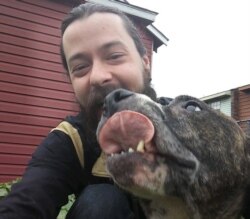Editor's Note: This is one in a series of profiles of Americans struggling with the economic impact caused by the coronavirus pandemic.
The economic fallout from the coronavirus pandemic has been acutely felt in New Orleans, Louisiana, by hospitality workers such as 32-year-old restaurant manager and bartender Luke Vincent, whose financial security is perilous even in the best of times.
“I haven’t gotten a paycheck in a month,” he said. “And it’s hard to see when I will again.”
Famous for its food, music and revelry, New Orleans relies more heavily on the hospitality and tourism industries than many other American cities. These sectors employ approximately 20% of the local workforce.
But these are not high-paying jobs.
“A large majority of these positions pay low wages,” explained Michael Williamson, CEO of the United Way of Southeast Louisiana. “This leaves residents with little savings to weather a crisis, such as losing a job during COVID-19.”
New Orleans emerged as a COVID-19 hotspot in March. As stay-at-home mandates extend from weeks to months, many in the city are experiencing increasingly acute financial hardship.
Vincent has lived in the city his entire life, minus a 2005 Hurricane Katrina-induced evacuation to Houston. Slim and bearded, he has worked at the same restaurant in the tourist-focused French Quarter for the past 13 years.
The restaurant ceased in-house service in mid-March, complying with a government order, and opted not to offer takeout service like other eateries in the city – a decision that left Vincent without a job and struggling.
Saving for a car
Before March, fortune seemed to smile on Vincent. Between his manager’s salary and tips from bartending, he said he made as much as $1,000 per week – a solidly middle-class American income. After paying bills, he was able to put a portion of that away and said he had a couple of thousand dollars saved before the crisis.
“Things were going pretty well,” Vincent said. He was saving up to buy a car since he currently navigates the city by bike or bus.
When stay-at-home mandates were imposed, he expected the restaurant to be closed for a week or two.
“Over the years I’ve been working here, we’ve had to close a few times – for hurricanes or renovations – but it was usually just for a few days. Never more than a week,” he said. “That’s what I thought we were dealing with here.”
Vincent said he has spent the time off catching up on chores, playing video games and enjoying quality time with his dog of more than a decade, Bea, named after American actress and comedian Bea Arthur.
“I’ve been through Hurricane Katrina, surely I can get through this,” he said, explaining his initial mindset when the pandemic struck. “I obviously underestimated things.”
Financial challenges
When stay-at-home orders extended into April, Vincent started to worry.
“My mindset went from, ‘This is like riding out a hurricane,’ to something way worse,” he said. “My savings felt like a lot when I was making money. But when you’re paying bills and you have no job, it disappears quickly.”
Vincent said he’s down to about $100 in his bank account and is getting desperate to receive unemployment benefits.
He began applying for those benefits at the end of March but said the system is overwhelmed.
“I go online to check my application’s status each morning,” he said, “but most of the time the website crashes.”
Vincent said he wants to be patient but is struggling without any income. Like many of his friends in the service industry, he’s also still waiting on a $1,200 stimulus check from the federal government. He is disturbed by rumors he has heard that some might not receive that check until as late as November.
“You can give me $1,200 whenever you want and I won’t complain,” he said with a laugh, “but I think November kind of defeats the purpose a little bit.”
In the meantime, he has applied for other, smaller grants – one organized by the United States Bartender’s Guild (USBG) and one created by local sports owner and philanthropist Gayle Benson – to help hospitality industry workers. In both cases, he faces stiff competition.
The USBG’s fund, for example, will award 20,000 grants of approximately $500 each. So far, they have received 285,000 applications and counting.
Health issues a concern
On top of financial stress, Vincent also has hypoglycemia – meaning he suffers from low blood sugar that can cause debilitating lightheadedness and shakiness. Regular and predictable food intake is crucial for his health.
“It’s my biggest worry,” he said. “If I don’t have enough money to pay for food, this can be really dangerous for me.”
Fortunately, an emergency food assistance program has agreed to deliver food to his door each week. Vincent said the deliveries have been a lifesaver, but they’re only meant to supplement your diet – not to be your entire diet.
“If I don’t get monetary aid soon, I won’t be able to afford groceries, and that’s probably the biggest stressor.”
That stress is also problematic for Vincent, who also suffers from anxiety for which he has been medicated in the past. Since the pandemic began, he said, he has begun to again experience panic attacks that trigger shaking, weakness, sweating, shortness of breath and dizziness.
“There’s so much to stress a person out,” he said. “How long will this last? How can I keep feeding myself without a paycheck? And TV is just full of conflicting information and terrible news.”
Hanging on
During Hurricane Katrina, Vincent evacuated to Houston with his mother and siblings, one of whom is autistic and another who has Down syndrome. As New Orleans recovered, Vincent returned while the others stayed in Houston.
Vincent said one major difference between this disaster and Katrina is this isolation from his family.
“My mother’s obviously older,” he said, “so she’s at greater risk. I’d never want to expose her or my special needs siblings to the virus. I couldn’t live with myself if I did.”
All Vincent can do now is wait and hope as his bank account nears zero. He said his landlord and utility companies have been understanding so far, but he also worries about accumulating thousands of dollars of debt he’ll have to pay off when the economy reopens.
“I’ve never felt this way before. Not even after Katrina,” he said. “I feel trapped. It’s helplessness. Total and complete helplessness.”






